
Clive Bull 1am - 4am
3 January 2024, 08:07 | Updated: 3 January 2024, 09:01
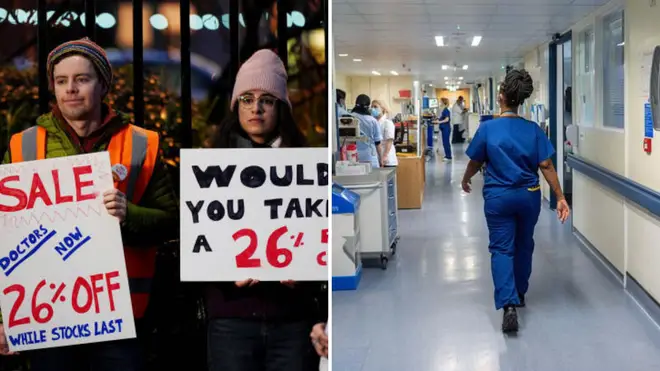
The head of an NHS trust that runs three hospitals has warned of the "huge impact" on patients of the six days of junior doctor strikes that have begun on Wednesday in England.
Nick Hulme, the chief executive of East Suffolk and North Essex NHS Foundation Trust, said that his trust has had to cancel hundreds of operations and thousands of outpatient appointments because of the strikes, which end next Tuesday morning.
Health bosses have warned that the strike, coming at the same time as a wave of winter viruses and an expected surge in people seeking delayed treatment after Christmas, could mean “one of the most difficult starts to the year the NHS has ever faced”.
Patients are expected to be hit by more than 200,000 cancellations during the walkout, and NHS leaders have warned the action will hinder efforts to reduce waiting lists and may put people off seeking care.
Mr Hulme said that the "impact on patients is absolutely huge".
He told LBC's Nick Ferrari of "the hundreds of operations that we've had to cancel, the thousands - across the three hospitals I’m responsible for - of outpatient [appointments] we’ve had to cancel."
Read more: Dominic Cummings was not offered a job in secret meeting with Rishi Sunak, says No10
Read more: New Ofsted boss says it could be 'more empathetic' as inspections pause after headteacher's suicide
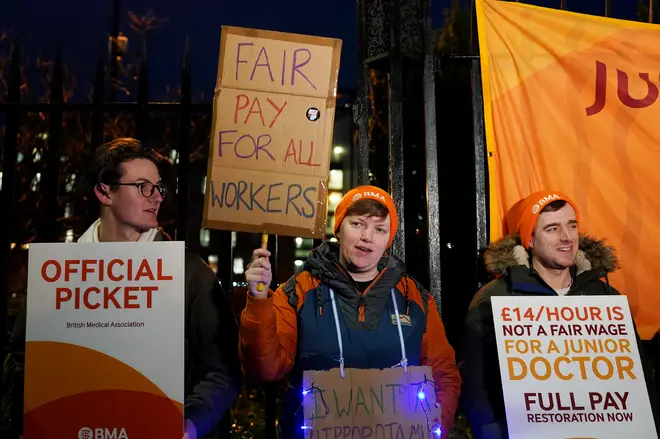
He said that "these are people who’ve already waited a very, very long time. So although we will maintain emergency service, we can assure people that if they require urgent care, maternity, A&E, ITU etc, the care will be safe, this has absolutely decimated our plans to attack the long waiting times."
He added that he was "frustrated" at both the doctors union and the government for the walkouts.
Mr Hulme said: "My frustration over the months and months now of industrial action has been the inability or the perceived inability for the Government and [doctors union] the BMA to get around the table and to compromise and to find a solution.
"We know with all negotiation, there needs to be a degree of compromise.
"Now, clearly, it's difficult to understand what happens behind closed doors, but if you just read the rhetoric that comes from both sides, it seems that there's an intransigent position and whilst that continues it's the patients who are paying the price."
He added: "It's above my paygrade to get involved, but I think it's important that the Government and the BMA do find a solution and find it quickly to stop these hundreds of thousands of patients being affected every single day when there is industrial action."
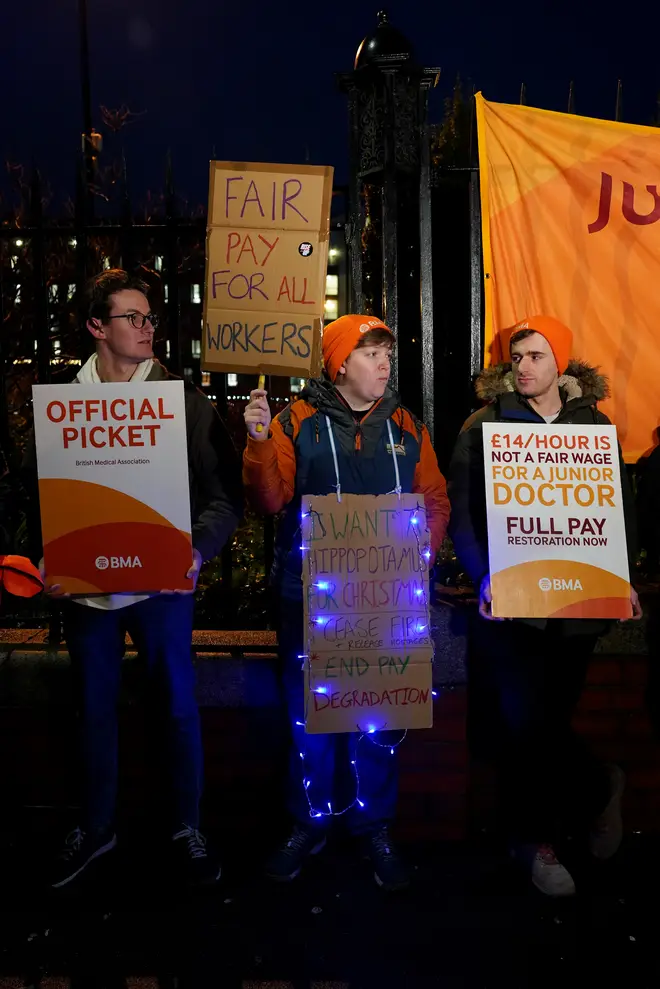
Layla McCay, director of policy at the NHS Confederation, told Nick that the timing of the strikes made them particularly difficult for the health service.
"Across the whole country [health leaders] are telling us that this particular industrial action, coming at the time that it does and being such a long duration, is going to be perhaps [the NHS'] toughest challenge yet" she said.
"Having junior doctors out on industrial action during that time, it won't just be challenging, it'll actually be very difficult to cover that level of service."
She added that if "one or two" consultants take sick leave during the strikes it will be very hard to provide cover.
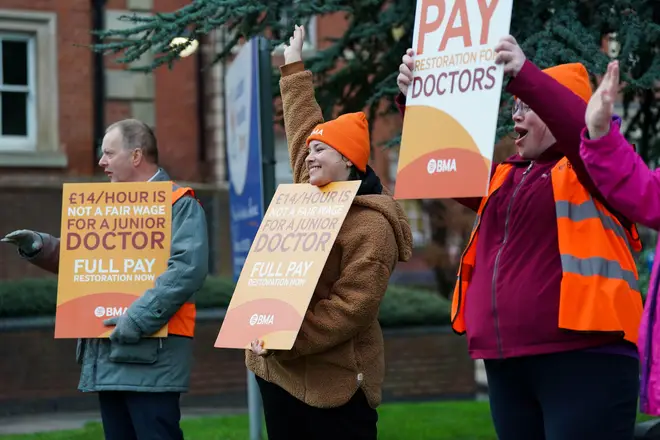
Doctors are striking again after their union, the BMA, said it was forced to take action and reject the government’s December pay offer, as it failed to compensate for a real-terms pay cut dating back to 2008.
Ministers offered the union a 3% increase to an average 8.8% rise during the talks in December.
The union is seeking “pay restoration” to 2008 levels, which it has estimated as the equivalent of a 35 per cent pay rise.
Dr Tal Ellenbogen of the BMA told Nick: "Doctors are demoralised, they're leaving left, right and centre. And if we don't take action, and we're complicit in the rota gaps, in the understaffing and long waiting lists patients are facing due to these cuts over the last 15 years."
Junior doctors have gone on strike for a total of 28 days since the pay dispute first started. So far, the strikes are believed to have caused a total of 940,000 appointment and operation cancellations, according to The Times.

Watch Again: BMA's Dr Tal Ellenbogen joins Nick Ferrari as six day strike begins
The prime minister’s official spokesman said the government was willing to return to the negotiating table on the advent of the strikes.
He said: “We have sought to come to a fair resolution — fair for the taxpayer, fair for hard-working doctors and health workers. We have achieved that in the majority of cases.
“As the health and social care secretary made clear, we are willing to have further discussions, but obviously the first thing to do is to stop striking.”
He also spoke of the impact of the strike during what is already “an extremely busy and challenging time for the NHS every year”.
“With so many operations having to be rescheduled as a result of strike action, we know that is having an effect on our ability to tackle that backlog,” he added.
Paul Farmer, chief executive at Age UK, said the strikes are 'deeply concerning for older people'.
He told The Times: “We know this is one of the busiest times of the year in the NHS, particularly for urgent and emergency care.
“We are deeply concerned about the risk this poses to older people’s health as, with the very best will in the world and efforts of staff, it will be difficult to guarantee safe and effective care for everyone who needs it.”
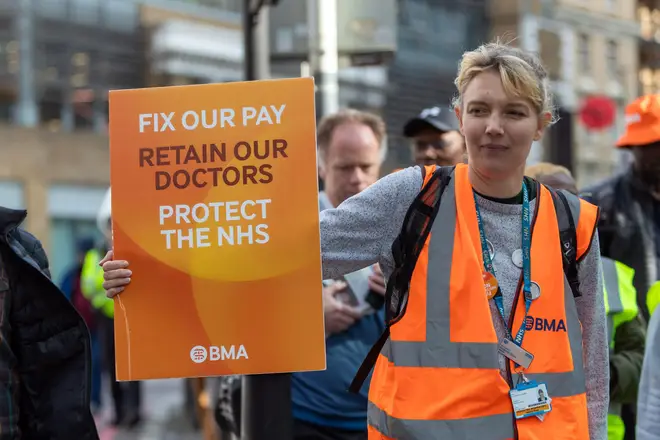
He also expressed his concern about how the strikes may put the elderly off seeking care during the walkout.
Mr Farmer also said: “We have increasingly heard from older people already struggling to access the help they need now worried what ongoing strikes mean for themselves, and their families on top.
“We know exactly how much older people value the care and support they receive from their doctors, but after nine months of industrial action we believe the current situation is simply unsustainable. We urge the government and the unions to get back round the table.”
The BMA has not agreed to any exemptions during the strikes despite requests from the NHS for doctors in areas such as fast-progressing cancers and corneal transplant eye surgeries to keep working.
The NHS has urged the BMA to respond rapidly to any requests for doctors to leave the picket line if there are “unpredictable events, major incidents [or] unexpected and extreme circumstances”.
Dr Robert Laurenson and Dr Vivek Trivedi, co-chairmen of the BMA’s junior doctors committee, said: “Patient safety is our top priority at all times, including during strike action, which is why we not only give trusts adequate notice to arrange appropriate cover but also have an established process with NHS England.
“Of course, these strikes don’t have to happen. We’ve been clear that it is the government that cancelled talks and we would still at this late hour encourage government to put forward a credible offer so that we can stop this strike and get back to doing what we really want to do: care for patients.”
The NHS has said that those who are unwell should use NHS 111 and other services as normal if needed.